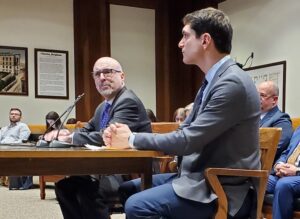Who is a member?
Our members are the local governments of Massachusetts and their elected and appointed leadership.

Melrose Mayor Paul Brodeur (left) stresses that the funding program is the primary mechanism to maintain locally owned roads. Also pictured is MMA Legislative Director Dave Koffman (right).
The MMA and local officials from across the state called for a significant increase in state aid for local road maintenance during a March 7 hearing before the Joint Committee on Transportation.
Supporters of the Chapter 90 local road and bridge program argued that it has lost nearly two-thirds of its purchasing power over the past 11 years, and that adequately maintained roads are critical to local economies and quality of life.
“We’re asking for an infusion of new life into the needs across the Commonwealth,” said Mansfield Town Manager Kevin Dumas, who testified, alongside the MMA and a number of municipal officials, in favor of an increase to at least $330 million per year, indexed to inflation.
The two-year Chapter 90 bond bill filed by Gov. Maura Healey in January (H. 52) would authorize $200 million per year for the reimbursement program.
MMA Legislative Director Dave Koffman thanked Healey and the Legislature for prioritizing Chapter 90 legislation, as communities are eager to put the money to use in the upcoming construction season.
Koffman pointed out that the Chapter 90 program has generally been level-funded for the past 11 years. Adjusting for inflation, the purchasing power of $200 million initially authorized in fiscal 2012 “is now just $68.6 million in today’s dollars.”
The MMA’s recent biennial Chapter 90 survey estimates municipal road repair needs at $715 million for fiscal 2024, underscoring the need for additional state support.
Fitchburg Mayor Steve DiNatale, Melrose Mayor Paul Brodeur, and Medford Mayor Breanna Lungo-Koehn stressed that the funding program is the primary mechanism to maintain locally owned roads. Easthampton Mayor Nicole LaChapelle emphasized the growing impacts of climate change on roads and the need for additional Chapter 90 funding to support weather-related repairs.
“Potholes do not stop at Easthampton’s boundaries,” she said, adding that communities are interconnected and safety risks on roadways are a concern for residents of neighboring communities as well as tourists visiting the area.
Athol Town Manager Shaun Suhoski, chair of Small Town Administrators of Massachusetts, described a bridge project connecting his town with Orange, a town of about 7,000 people. He noted that Orange had to set aside more than two years of its Chapter 90 funding for the one project.
Rep. Bill Straus, co-chair of the Transportation Committee responded that Chapter 90 is not intended for major capital projects, and there are other state grant programs that can be used to supplement Chapter 90 for large projects.
Suhoski clarified that Orange had received a small bridge repair grant for a prior project, but the grant covered less than half of the $1 million cost, and Chapter 90 was needed to fill the gap.
David Knowlton, the public services director and city engineer in Salem, praised the partnership that municipalities have with the Massachusetts Department of Transportation. As a Complete Streets community, Salem’s transportation projects support all road users, including repairs to roads, sidewalks and curbs, the replacement of ADA-compliant ramps, and more. He said additional Chapter 90 funding would help the city prioritize a wider variety of projects on a limited budget.
Knowlton asked that Chapter 90 funds be made available as close to the start of the construction season as possible, targeting April 1, which helps municipalities begin construction early and avoid the higher costs associated with late-season projects.
Massachusetts Highway Association members Mike Hale and Dave Desrosiers, public works directors in Gloucester and Granby, respectively, addressed construction inflation, such as the rising costs of asphalt, and the challenge of maintaining roads with such limited funding.
The MMA also submitted written testimony that highlights the reduced purchasing power of Chapter 90 and the need for a multi-year authorization. The MMA noted that 58% of MMA survey respondents are saving multiple annual allotments to pay for larger projects or have done so in the past five years.
During the hearing, several people questioned the formula used to determine Chapter 90 apportionments.
Rep. Michelle Ciccolo praised the Chapter 90 program and testified in support of an increase, but also asked the committee to review a bill she filed with Rep. “Smitty” Pignatelli (HD. 3084) that calls for a commission to review the formula to make it more equitable. HD. 3084 is one of several bills filed this session that would either reconfigure or review the Chapter 90 formula.
The Transportation Committee will now provide a recommendation on H. 52, after which the bill is expected to go to the Joint Committee on Bonding, Capital Expenditures and State Assets.